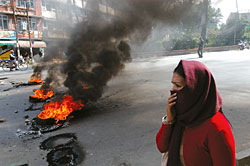 MIN RATNA BAJRACHARYA |
to understand what was happening here.
The similarities were striking. A mountainous land at the fringes of the modern world with huge inequities among ethnicities, economic classes and locations played host to a shadowy guerrilla movement, intent on overthrowing a central state. The Peruvian rebels paid homage to an ideology that many thought outdated and discredited, even in the land of its conception: China.
The insurgents fought in distant hills, attacking isolated police posts at night and depended for sustenance upon a rural peasantry caught in the crossfire. The Nepali Maoists themselves encouraged the comparison with Peru's Sendreo Luminoso, in statements, international tie-ups and graffiti on roadside rock faces.
Not that they wanted to emulate the fate of Abimael Guzman, Sendero's founder and bloody-minded leader. He was captured in 1992, and discredited himself by calling for a surrender by his cadres a year later. The Peruvian state's decision to dress Guzman in black and white stripes and display him to the public in a cage helped defuse the horrific fear of an entire nation.
Plans to put Pushpa Kumar Dahal in such a cage were no doubt drawn up in Nepali government circles in the late 1990s and early part of this century. They probably sit there still, stained with whiskey and tears, in some retired Army general's study.
Other aspects of the Peruvian state's victory over Sendero (death squads, torture dens and general brutality) were contemplated too, and probably not discouraged by the ranks of conflict resolution specialists from foreign parts who kept this city's hotels and bistros going in the darkest days of the war.
Mountains, Maoism, murderous violence, all these similarities occurred to any of us trying to comprehend Nepal's version of the 'People's War' in the years before the Comprehensive Peace Agreement. We shuddered at the thought of this fair land emulating far off events in the Andes. The comparisons were both valid and spurious, as all these things are, as I was told in 2002 by a Peruvian academic on assignment here with an environmental organisation.
"Don't let them turn this into Peru," he warned. For my friend, this meant a horrific police state, a populace riddled with informants and an economy twisted by cocaine trafficking. "Nepal can't be like this," he told me.
Our conversation meandered and we decided that there was one crucial similarity with Peru that needed to be addressed here: the huge imbalance in resources and political power and resources between the capital city and the rest of the country.
Kathmandu is Nepal's Lima and still is: a vast black hole of corruption, cynicism and coercive power that both preys upon and ignores a troubled hinterland. Good intentions come to the city and become avarice and disinterest. Suitcases of thousand-rupee notes warp the processes of politics, compromise and peace building.
Contractors, dalals and influence peddlers abound, especially those with access to the foreign funds that our aidocrats fling about with impunity, disregarding their destructive impact on the polity. Both Kathmandu and Lima were and still are city states in dysfunctional lands. Both countries cry out for devolution and new urban centres of power that will distribute political power beyond their respective Ring Roads.
What's happening now in Nepal's regions (strikes, bandas, sovereignty movements) is a defacto form of devolution that was once dejure before Maoist comrades and their monarchist cronies wrecked it in the 1990s. I burn with anger when I see a foreign voice raised against federalism or devolving power for I know that the willful ignorance behind such opinionating is a comfort to the soul of a mediocrity.
Nepal is not Peru. We need not follow the dreadful tarnished path of that tortured Andean land. But Kathmandu is definitely Lima. And the sooner it becomes just another city in a devolved, federal, modern state, the quicker we can drop the cross-continental.



